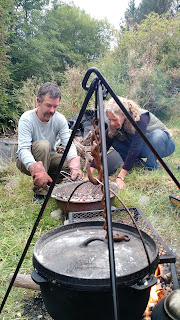
As I was preparing to leave the UK last Friday, I felt a certain sadness. I felt sad leaving behind both family members and new friends. I felt sad that I wouldn't be meeting more interesting people and discovering new ministries. But I also felt sad about my overall experience of the UK. I had arrived at an interesting time. It was the height of the refugee crisis and there was much talk about how best to respond. There was media coverage about what the British government should be doing, the offer of space for 20,000 people paling in comparison to the hundreds of thousands being welcomed by Germany. There were calls for people to do more but equal comments about terrorists pretending to be refugees, welfare tourists, and "too many Muslims". I also arrived during the race for the Labour leadership. The discourse was "Old Labour" versus "New Labour", the question of electability versus authenticity. Was Jeremy Corbyn too far left or was he injecting new energy into the party? There was some talk about social justice and the desire for Britain to be compassionate again, but I often felt surprised by how far right Britain has tilted in recent years.
Now there was a sense of hope as I got ready to leave. I recalled my first weekend when I visited a Quaker meeting and a woman spoke of going to Calais to deliver clothes and toiletries to refiugees. I remembered my experience of authentic welcome at Luminous and Order of the Black Sheep, and of Tina working with the hard to house in Southport. I thought of Archbishop Justin Welby ready to offer space in Lambeth Palace for refugees. And I thought of the community Glen and I visited in our last week.
"Somewhere Else", also known as the Liverpool Bread Church, began in 1999, and was one of the communities first highlighted in "Mission Shaped Church". The Bread Church is a faith community which worships through making bread. It seems odd at first but it is an amazing experience as longtime participants and newcomers gather around the table to make bread and create community. I was struck by how Rev. Ian and the volunteers made everyone feel welcome. One of the key principles of the Bread Church is creating a space of inclusion. It is a diverse group who comes together, with a significant number of people with cognitive challenges kneading dough beside moms with children, folks who are unemployed, and the occasional visitor from overseas. One of the ways they do this is by making the Bread Church a mobile phone free zone. The policy is there to keep people from being distracted by outside calls but I suspect it also offers a sense of safety when people know they aren't being talked about or photographed.
We need more Bread Churches and ministries like it. The gap between rich and poor seems to be increasing in the UK with much talk about being tough on people abusing welfare and a focus on needing to create a more aspirational culture. An example of that is seen in the Olympic Village that Glen and I were able to see just before we left. It was built in a part of East London that was formerly Industrial and lay empty and before the Olympics there was a lot of talk about it being a catalyst for renewal in the area. I wonder how much this has happened. We were staying near the site and it didn't seem that renewal was spilling over the railway tracks from the site to East Londoners but instead there were two worlds, with the people of the area continuing to struggle while wealthier folks move into the new apartments being built near the sports facilities and shops of Queen Elizabeth Olympic Park.
Now I have returned to Canada at the tail end of the election. As I follow media coverage I am struck that I see many of the dynamics I saw in the UK playing out here. But here I have a voice. I pray that as we cast our votes we will do so seeking a more compassionate and inclusive Canada.












